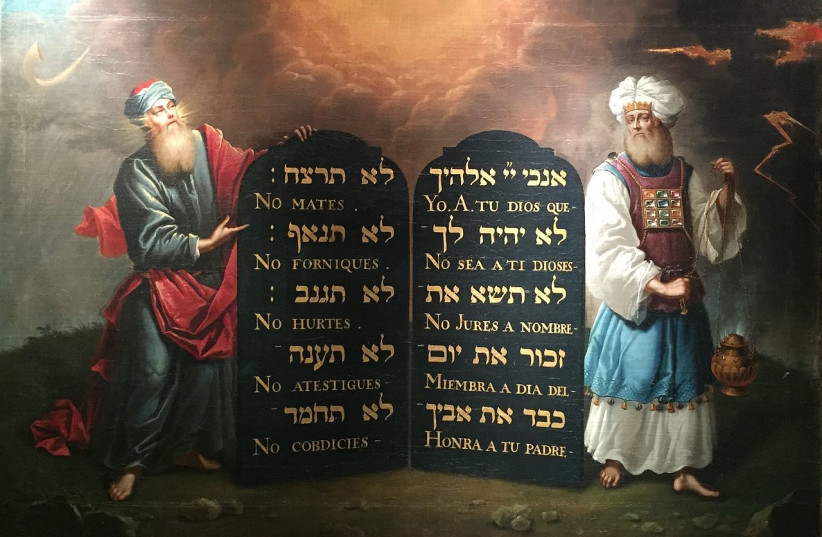Parashat Yitro, which we will read this Shabbat, describes the defining event of the Jewish people throughout the generations: the revelation at Mount Sinai.
It was on this occasion that the entire nation – men, women, and children – heard the Ten Commandments, the abbreviated manifesto of Judaism.
At this foundational event, the people were given the role of being a “kingdom of priests and a holy nation,” the people that would carry the banner of holiness and strive to lead all of humanity to a life of faith and morality.
The Jews become a holy nation
This important status was preceded by negotiations between God and the people, with the mediator being Moses. God sent Moses to offer to the nation to accept the Torah.
“So shall you say to the House of Jacob and tell the people of Israel: ‘You have seen what I did to the Egyptians, and [how] I bore you on eagles’ wings, and I brought you to Me. And now, if you obey Me and keep My covenant, you shall be to Me a treasure out of all peoples, for Mine is the entire Earth. And you shall be to Me a kingdom of priests and a holy nation’” (Exodus 19:3-6).
“So shall you say to the House of Jacob and tell the people of Israel: ‘You have seen what I did to the Egyptians, and [how] I bore you on eagles’ wings, and I brought you to Me. And now, if you obey Me and keep My covenant, you shall be to Me a treasure out of all peoples, for Mine is the entire Earth. And you shall be to Me a kingdom of priests and a holy nation’”
Exodus 19:3-6

Moses carried out the mission entrusted to him and offered to the elders of the nation “all these words that the Lord had commanded him,” and the entire nation answered with wonderful unity: “All that the Lord has spoken we shall do.”
The impression that emerges from reading this Torah portion is that the acceptance of the Torah by the Jewish nation was done willingly and wholeheartedly. But in the Talmud we find a different description, quite the opposite, regarding the nation’s consent to receive the Torah.
Rabbi Avdimi bar Hama bar Hasa said: “The Jewish people actually stood beneath the mountain, and the verse teaches that the Holy One, blessed be He, overturned the mountain above the Jews like a tub, and said to them: ‘If you accept the Torah, excellent, and if not, there will be your burial’” (Shabbat 88).
The words of the Talmud indicate that God forced the people of Israel to accept the Torah by threatening them. This description raises a number of questions: First, why did God have to force the acceptance of the Torah after the people had wholeheartedly agreed to it? Second, the Torah seems to describe a completely different situation. Third, what value does consent have if it is obtained through threats and coercion?
JEWISH THINKERS throughout the ages have pondered these questions and answered them in different ways. Let’s look at what two of them said.
The Baal Shem Tov, the founder of the Hassidic movement (Ukraine, 18th century), saw this coercion as an important lesson for man.
The people did indeed accept the Torah of their own free will, and no coercion was required. But we are all familiar with human nature: Goodwill is something that may disappear. Sometimes a person really wants to do the good and right thing, but sometimes that same person is preoccupied with problems and difficulties and can’t make the effort to do the right thing. For these times, the Baal Shem Tov said, God imposed on the people the acceptance of the Torah as if to say: You should know that goodwill works some of the time, but at other times you will have to force yourselves to make the effort, fighting momentary impulses in order to follow the straight path.
Another important thinker who dealt with this is the Maharal of Prague (Rabbi Judah Loew, Bohemia, 16th century). He saw this coercion as an essential aspect of the Jewish worldview.
Also in his opinion, the people accepted the Torah of their own will, and this is the proper and good way to receive the Torah. However, acceptance on the basis of goodwill has a perpetually precarious dimension to it. When a person lives with a sense of volunteering, he does not see his lifestyle as obligatory, one that is impossible to change. God wanted the people to accept the Torah of their own free will, but it was important for Him to convey another message: A Jew cannot do without the Torah. The people of Israel without the Torah loses its identity and existential meaning. The coercion was not intended to coerce the people but to teach them that Torah life is not a voluntary matter. Rather, it is an existential and essential component of their identity as a nation.■
The writer is rabbi of the Western Wall and holy sites.
